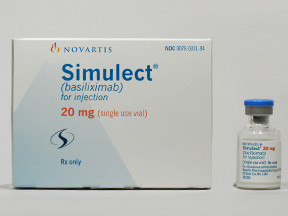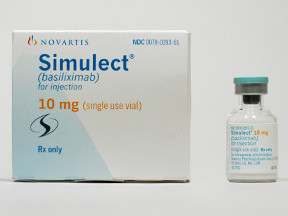BASILIXIMAB - INJECTION
PHONETIC PRONUNCIATION: (BA-si-LIX-i-mab)
COMMON BRAND NAME(S): Simulect
GENERIC NAME(S): basiliximab
Uses
USES: Basiliximab is used to prevent organ rejection in people who have received a kidney transplant. It is usually taken along with other medications (e.g., cyclosporine, corticosteroids) to allow your new organ to function normally. Basiliximab is an immunosuppressant drug known as a monoclonal antibody. It works by slowing down your body's defense system (immune system) to prevent your body from rejecting the new kidney after surgery (acute rejection).
How to use BASILIXIMAB - INJECTION
HOW TO USE: This medication is given by injection into a vein by a health care professional. It is usually given in 2 doses. The first dose is given within 2 hours before the transplant surgery, and the second dose is given 4 days after surgery. Dosage is based on your age, weight, medical condition, and response to treatment. This medication is used with other medications (e.g., cyclosporine, corticosteroids) to prevent rejection of transplanted organs. Take all medications exactly as prescribed by your doctor. If you have any questions, ask your doctor or pharmacist.
Side Effects
Precautions
Interactions
Overdose
Images
Reviews
Faq for BASILIXIMAB - INJECTION
Basiliximab is a medication that is used to prevent organ rejection in people who have received a kidney transplant.
Basiliximab is a type of medication called an immunosuppressant. It works by blocking a certain protein on immune cells, which helps to reduce the body's immune response and prevent rejection of the transplanted kidney.
Basiliximab is given as an intravenous (IV) infusion. It is usually given in two doses, one before the transplant surgery and another four days after the surgery.
The most common side effects of basiliximab include fever, high blood pressure, headache, nausea, and pain at the injection site. These side effects are usually mild and go away on their own.
Basiliximab is usually given for a few weeks after the kidney transplant surgery to help prevent rejection. After that, your doctor may prescribe other immunosuppressant medications to continue to prevent rejection.
Yes, basiliximab can be used in children who have received a kidney transplant. The dosage and administration may be adjusted based on the child's age and weight.
Basiliximab may interact with other immunosuppressant medications or medications that affect the immune system. It is important to inform your doctor about all the medications you are taking, including prescription and over-the-counter drugs, as well as any herbal supplements.
It is not known if basiliximab passes into breast milk. It is recommended to consult with your doctor before breastfeeding while taking basiliximab.
Basiliximab should be stored in the refrigerator, at a temperature between 2°C and 8°C (36°F and 46°F). Do not freeze the medication. Keep it in the original packaging until ready to use.
Disclaimer
IMPORTANT: HOW TO USE THIS INFORMATION: This is a summary and does NOT have all possible information about this product. This information does not assure that this product is safe, effective, or appropriate for you. This information is not individual medical advice and does not substitute for the advice of your health care professional. Always ask your health care professional for complete information about this product and your specific health needs.


No Reviews Yet